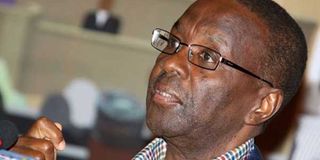Mutunga says PAC report on Judiciary full of inaccuracies

Chief Justice Willy Mutunga speaks during the launch of a democracy campaign programme at Intercontinental Hotel on October 30, 2015. Mutunga has criticised a report by a parliamentary team recommending measures to root out graft in the Judiciary, after an audit report exposed massive corruption. PHOTO | JEFF ANGOTE | NATION MEDIA GROUP
What you need to know:
- The Head of the Judiciary singled out the report by the National Assembly’s Public Accounts Committee (PAC) for its abusive language and inaccuracy.
- The inaccuracy in sections of the report, he said, was a result of either genuine lack of information, or a consequence of a deliberate effort to mislead the committee.
Chief Justice Willy Mutunga has criticised a report by a parliamentary team recommending measures to root out graft in the Judiciary, after an audit report exposed massive corruption.
The Head of the Judiciary singled out the report by the National Assembly’s Public Accounts Committee (PAC) for its abusive language and inaccuracy.
But Dr Mutunga said he agreed with most of the contents, saying it confirmed what the Judiciary’s own report said on the extent of corruption and loss of billions of shillings that resulted in the sacking of former Chief Registrar of the Judiciary Ms Gladys Boss Shollei.
In his letter dated October 27, and copied to among others the chairman of PAC, Mr Nicholas Gumbo, the CJ said the arms of government should come up with an accountability framework for the heads of the three arms, vis-a-vis each other, particularly as concerns appearance before committees of Parliament.
He said the need for accountability, enshrined in the Constitution, should be achieved while ensuring integrity and independence of the various arms remain intact.
“This will help eliminate the use of needlessly abusive, inappropriate and intemperate language as contained in some sections of this (PAC) report,” he said.
DIMINISHING JUDICIARY
He said such abusive language only served to diminish the status and public confidence of the Judiciary and Parliament.
Dr Mutunga, who has announced an early retirement as head of the Judiciary, said the institution remained accountable and has eschewed the easier option of isolation founded on “radical or fundamentalist” notions of independence.
He said the Judiciary was driven by the belief that an independent organ of government delivered better on its mandate by embracing the principle of inter-dependence.
Saying that the Judiciary was not infallible on some of the issues raised in the report, he urged Parliament to show fidelity to fact in its writings, and an obligation to be “honourable” in its language and reporting.
“A literary review of its report should distinguish it by its sheer force of logic, reasonability, truth, respect and a recognisable disinclination to be personal,” says the CJ.
The inaccuracy in sections of the report, he said, was a result of either genuine lack of information, or a consequence of a deliberate effort to mislead the committee.
PROSECUTION AFOOT
He said PAC declined his request to give additional information, and added that had his request been granted, some of the issues before the report was concluded, the misrepresentation would not have occurred.
The committee chaired by the Rarieda MP was also accused of failing to send questions the Chief Justice was required to respond to, as he had requested, saying had it been the case, the inaccuracies in each of the five recommendations, would not have occurred.
The letter by the Chief Justice also noted that some of the recommendations contained in the report by PAC had been overtaken by events, as the disciplinary processes had occurred as well as recovery processes of money irregularly advanced.
He also noted that prosecution of some of the officers mentioned in graft cases had started, following their suspension two years earlier, and that the requisite institutional policies to curb future corruption within the Judiciary had been developed.





